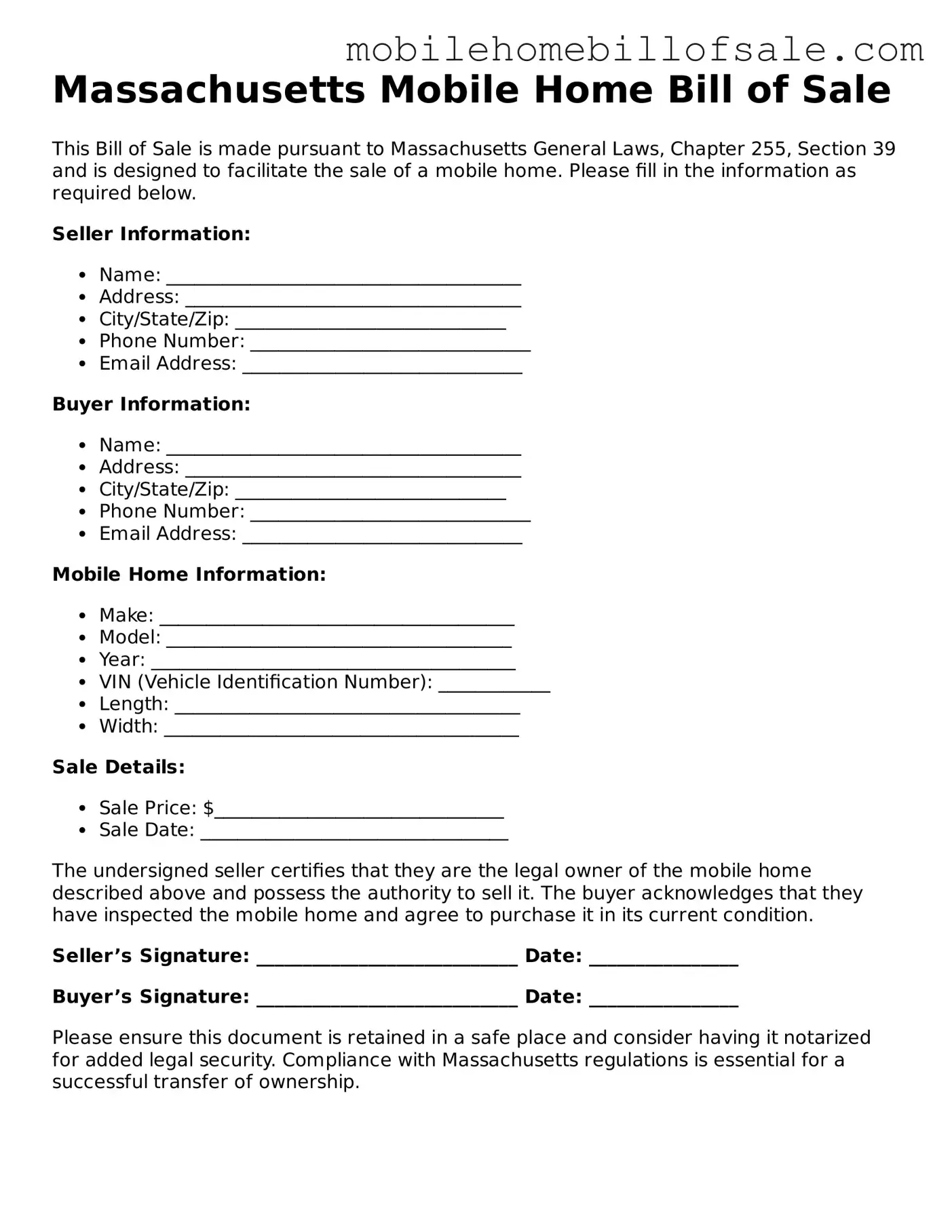The Massachusetts Mobile Home Bill of Sale form shares similarities with a Vehicle Bill of Sale. Both documents serve as proof of transfer of ownership from one party to another. Just like a vehicle bill of sale, the mobile home version includes essential details such as the names and addresses of the buyer and seller, a description of the mobile home, and the sale price. This ensures that both parties have a clear record of the transaction, which can be crucial for future reference, especially in cases of disputes or registration needs.
Another document similar to the Mobile Home Bill of Sale is the Real Estate Purchase Agreement. While the latter is typically used for traditional property sales, both documents outline the terms of a transaction. They include details such as the property description, sale price, and conditions of sale. Both documents aim to protect the interests of the buyer and seller by providing a clear framework for the transaction, ensuring that all parties understand their rights and obligations.
The Rental Agreement is also comparable to the Mobile Home Bill of Sale, particularly when it comes to mobile homes that are rented rather than sold. Both documents detail the terms of use, including the responsibilities of the tenant and landlord. They include information such as rental amounts, duration of the agreement, and maintenance responsibilities. While one pertains to ownership and the other to tenancy, both serve to clarify expectations and protect the rights of the involved parties.
In addition, the Boat Bill of Sale is akin to the Mobile Home Bill of Sale. Both documents facilitate the transfer of ownership for movable properties. They include similar elements such as the buyer's and seller's information, a detailed description of the item being sold, and the sale price. This ensures that the transaction is documented properly, which can be important for registration purposes and future ownership verification.
The Lease Agreement for a mobile home lot is another document that shares characteristics with the Mobile Home Bill of Sale. While the bill of sale is focused on the transfer of ownership, the lease agreement governs the rental of the land on which the mobile home sits. Both documents address the rights and responsibilities of the parties involved. They typically include terms regarding payment, duration, and maintenance, ensuring that all parties are aware of their commitments.
Additionally, the Equipment Bill of Sale is similar in nature to the Mobile Home Bill of Sale. Both documents function as proof of ownership transfer for personal property. They include essential information such as the buyer and seller's details, a description of the equipment or mobile home, and the sale price. This creates a clear record of the transaction, which can be beneficial for warranty claims or future sales.
The Homeowners Association (HOA) Agreement also bears similarities to the Mobile Home Bill of Sale, especially in communities where mobile homes are located. Both documents can outline rules and responsibilities regarding property use. While the bill of sale focuses on ownership transfer, the HOA Agreement typically includes regulations that homeowners must adhere to, ensuring community standards and property values are maintained.
The Warranty Deed is another document that can be compared to the Mobile Home Bill of Sale. Both documents serve to transfer ownership, but a warranty deed provides a guarantee that the seller holds clear title to the property. While the Mobile Home Bill of Sale confirms the sale, the warranty deed gives the buyer additional security regarding the ownership rights they are acquiring. This distinction can be important for buyers seeking assurance about their investment.
Finally, the Affidavit of Title is similar to the Mobile Home Bill of Sale in that it addresses ownership. This document is often used to affirm that the seller has the right to sell the property and that there are no liens against it. Both documents provide a level of protection for the buyer, ensuring that the transaction is legitimate and that the buyer will not face unexpected claims or disputes after the sale is completed.

